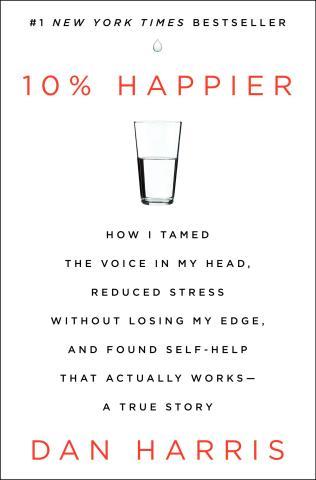Life can be challenging at times, as scientists in training you know this all too well. When daily life doesn’t go as planned it can lead to lack of motivation, frustration, and sadness. Stress and strain can be draining, leaving you with less than 100% of yourself to put into your work, relationships, and pleasurable activities. How do you make it through? Resilience—it can help you manage the tough times allowing you to persist and persevere in whatever the challenge may be.

Dan Harris is a correspondent for ABC News, an anchor for the show Nightline, a meditation skeptic turned believer, and the author of the book 10% Happier: How I Tamed the Voice in My Head, Reduced Stress Without Losing My Edge, and Found Self-Help That Really Works – a True Story.
After an on-air panic attack in 2004, Harris went on a journey to figure out why he had been experiencing panic attacks. Part of this journey led him to discover the benefits of meditation and he now wants to spread the word.

Find yourself swamped with work but unable to focus? Ever wonder how to quit procrastinating? At OITE, we often get asked about strategies and tips on how to improve one's time management and productivity. This From the Archive post offers unlikely advice on how to handle these work challenges.
For many, the holiday season is joy-filled and terrific. Some of us however, experience the holiday blues as we feel loneliness, reflect on the past year, and possibly dread an upcoming and uncertain new year. Rates of depression and anxiety tend to spike during the holiday season. If you are already experiencing stress in other areas of your life, then you may be especially vulnerable to holiday stress this season.
The holiday season often brings twinkling lights, and at the same time long to-do lists and a variety of different stressors:
Everybody seems busy today. In fact, according to an op-ed in the New York Times, many Americans are addicted to this ‘busy trap.’ Guilt and anxiety seem to arise if you aren’t managing multiple projects at once. Because of this daily grind – self-imposed or not – many aren’t able to find time to plan and strategize their career development. Most job seekers lament that there just aren’t enough hours in the day.
Post written by Sharon Milgram, Director of The Office of Intramural Training & Education. Science careers, at or away from the bench, require us to be life-long learners. To be successful, we are always learning – and teaching – new skills. While many of us enjoy this, it also comes with frustrations and challenges. In considering how we learn, I was struck by the excellent and concise explanation of the stages we typically go through as we learn and develop new skills.
There are many important aspects to having a successful career. One aspect often overlooked is making sure you have a community of peers. Communities provide more than just support for everyday life and challenges. They are great for building networks, developing co-mentoring relationships and gaining leadership experience. Coming to a large campus, like the NIH or a college campus, can feel like you have landed on a different planet. Everything is so different.
Post written by Sharon Milgram, Director of The Office of Intramural Training & Education.
Last week at the NIH, Daniel Goleman delivered a talk about Emotional Intelligence and how it influences leadership. The premise of Emotional Intelligence is that understanding your emotions, the emotions of others, and how the two interact allows us to be more successful and happier.
Emotional Intelligence suggests that to be successful the following traits are important:
You have a new job! (or hope to soon). Here are some tips to make the transition to your new position successful and as easy as possible.
First, remember that transitions are always tough. While you are likely very excited about a new position, the transition can be overwhelming, especially if you are moving to a new location. You are closing out a chapter in your life that has likely lasted between two and five years (or more). You are saying goodbye to friends and colleagues and disrupting an established routine—so some anxiety is totally normal.

